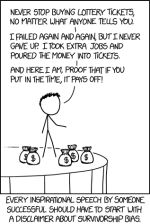https://www.theguardian.com/lifeand...ire-millennials-avocado-toast-house?CMP=fb_us
An Australian millionaire and real estate mogul has advice for millennials struggling to purchase a home: stop buying avocado toast.
Tim Gurner, a luxury property developer in Melbourne responsible for over $3.8bn in projects, is facing heat for comments he made on 60 Minutes in Australia, implying that young people can’t afford to buy property because they’re wasting money on fancy toast and overpriced coffee.
Here's a better idea. Millennials, if you want a house, vote in a legislature that will institute living wage and worker protection laws, a tax code that restricts the hording of wealth while providing for the common good, and will not be afraid of nationalizing industries that, for whatever reason, become "too big to fail."
Edit
I think there's a point to what he is saying. It might be clearer if phrased slightly different. Today the wheels of capitalism are spinning extremely fast. It's easier than ever to make money. With very little effort. It's also easier than ever to blow cash on stuff. In the modern world the working class are compared to the olden days, extremely wealthy today. Back in the day being working class meant that there wasn't much you could buy. So you didn't. They were also constantly one step away from the gutter. Today, that's only a potential problem if you're mentally ill.
The problem with our modern working class is that the working class culture from yea olden days, has just drifted into the modern age. It is still primarily focused on consumption. But the way the market works is that assets are partly limitted on how rich other people are. If everybody is rich today (compared to yea olden days) means that the working class has to start behaving like the yea olden days middle-class if they want access to properties yea olden days workers could afford. But not modern working class.
Today the working class can afford the trappings that used to be associated with the extreme elites of society. So that's what they do. I mean, who the fuck really needs a designer bag? Go into any working class neighbourhood and it's overflowing with designer bags.
Since the 90'ies high status is associated with being able to blow unnecessary cash on "environmentally friendly" foods. That's the "Air Jordans" or "gold watch" of today. If you thought buying eco friendly locally grown produce was about saving the environment you are a capitalist tool. That's where the avocado comes in. It's luxury consumption.
I think he's criticising the entire mind-set of... Let's not call them milleneals. Let's call them the modern working class. The way I interpret what he's saying is that they should be less focused on luxury consumption in order to show off money (they don't have). And instead try to figure out how to invest money and get financial leverage. In today's world that is necessary today.
There's a lot of people today who have no savings. Instead they have debts. Well... that just won't cut it today. And if you've got no savings but still blow your cash on luxury consumption you're screwing yourself over.
It's not so much about the avocado toast. It's more about the mindset. If a poor person thinks that avocado toast is a good idea, it's evidence of a deeper, more systematic problem in society.
We need a new working class culture today. At least when it comes to handling money. We need one that's more in line with how the middle-class used to behave fifty years ago. If we don't we're just wasting resources and opportunities.
Right now we're taking oil from the ground, burning it on nothing, and releasing it into the atmosphere and have nothing to show for it. Not only. But to a large degree. We need to stop.
In the 19'th century the highest ideal for the British was to not work. Any job, no matter how classy was below having property and living off rent. The goal was to earn enough so you could stop earning. In USA the highest ideal was to be rich, and getting ever increasingly rich. The British Empire put a lot of money into British society and they blew it on doing nothing. Well.... writing poetry. Basically. The 19'th centuries poetry culture ideal is the avocado toast of today. As a result the British have very little to show for once having had an empire. They squandered their edge on bullshit. And USA is still rich. Now of course Great Brittain has been forced to change attitudes. And that old ideal is completely dead. Because it didn't serve the British. Same goes for the avocado toast.
It's a subtle shift in attitudes. But it's important.
Anyhoo... just my two cents.



